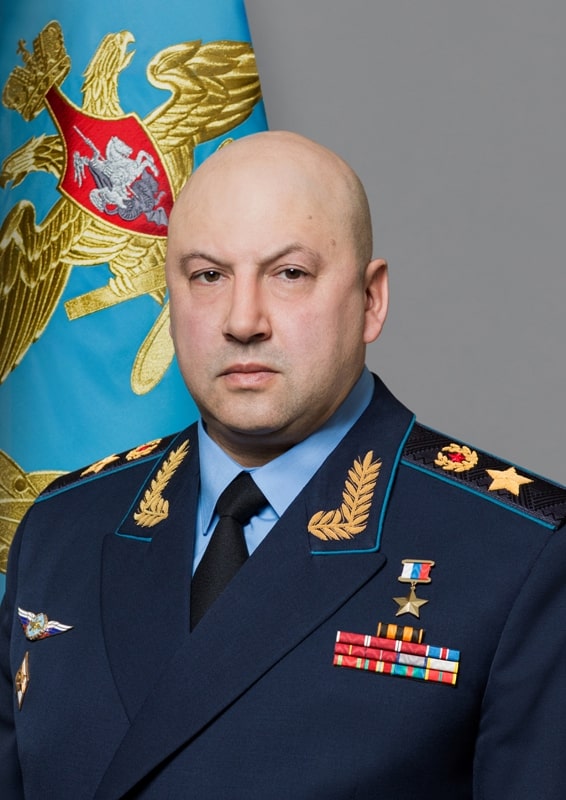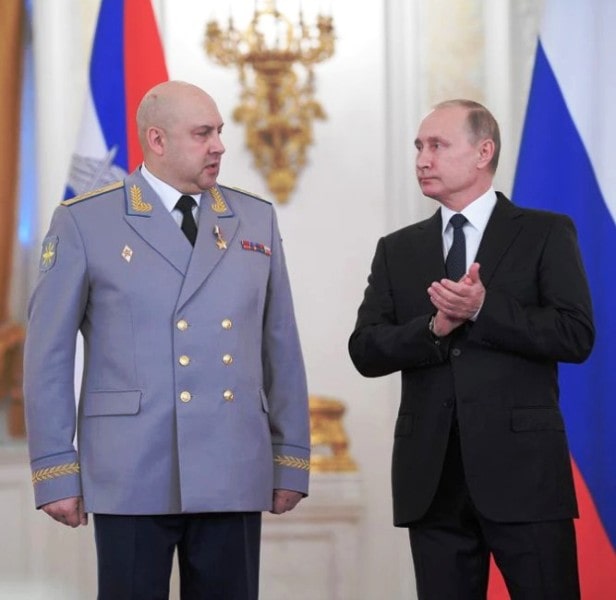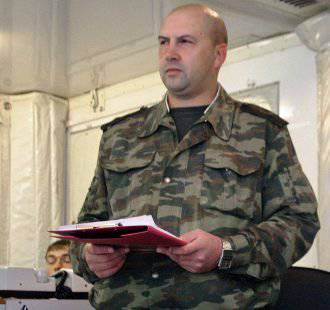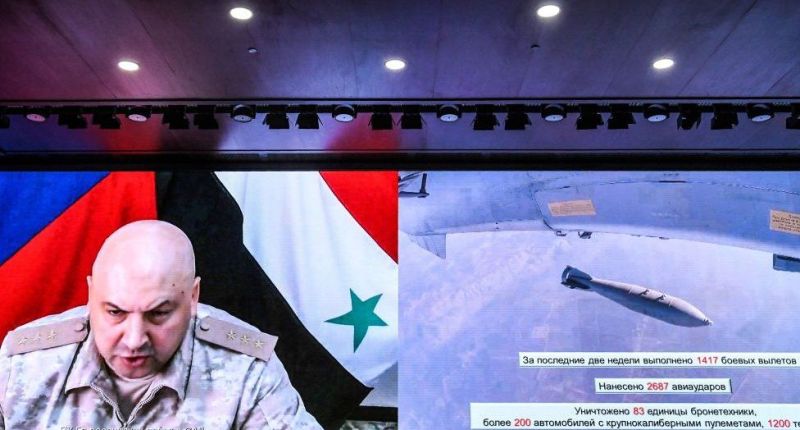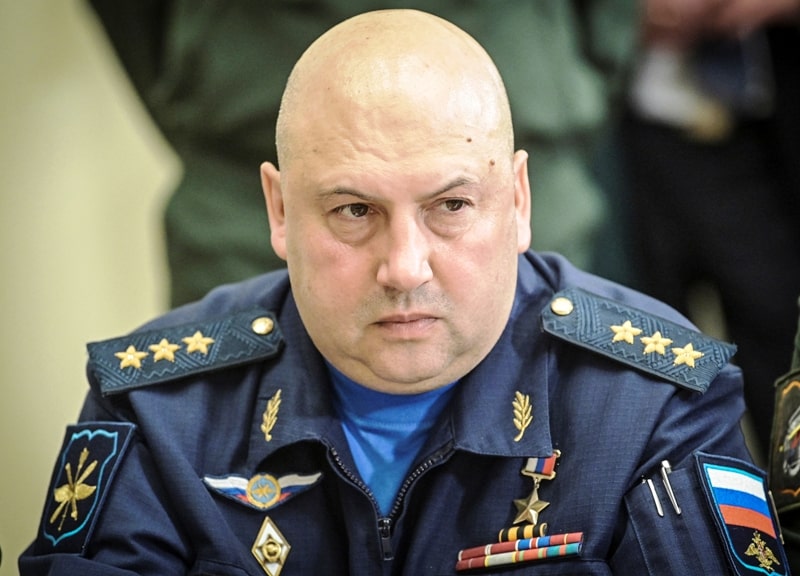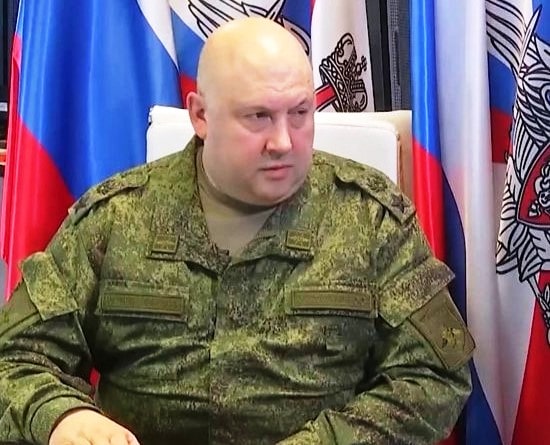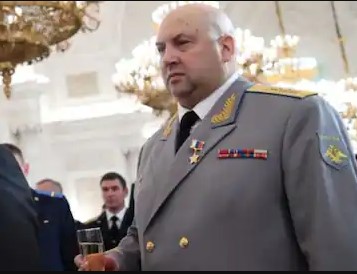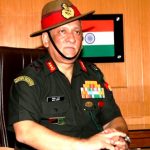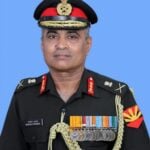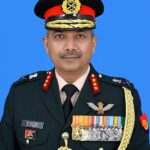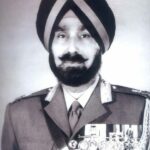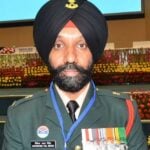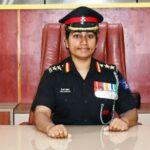Sergei Surovikin Age, Wife, Children, Family, Biography & More
| Bio/Wiki | |
|---|---|
| Full name | Sergei Vladimirovich Surovikin [1]Sergei Surovikin’s Twitter account |
| Names earned | • General Armageddon [2]The Guardian • Butcher of Syria [3]Atalayar |
| Profession | Army Personel |
| Famous for | • Commanding the Russian Forces in Syria • Commanding the Russian Forces in Ukraine |
| Physical Stats & More | |
| Height (approx.) | in centimeters- 175 cm in meters- 1.75 m in feet & inches- 5’ 9” |
| Eye Colour | Dark Brown |
| Hair Colour | Bald |
| Military Service | |
| Service/Branch | Russian Army |
| Rank | Four-Star General |
| Service Years | 1987 - present |
| Commands | • 2nd Guards Tamanskaya Motor Rifle Division (1991) • 201st Division • 34th Simferopol Motorized Rifle Division (2002) • Senior Commander of the 42nd Guards Motor Rifle Division (2004) • Deputy Commander of the 20th Guards Combined Arms Army (2005) • Commander of the 20th Guards Combined Arms Army (2005) • Eastern Military District (2010) • Commander of the Air Defense Forces (2013) • Commander of the Russian Armed Forces (2017) • Russian Aerospace Forces (2017) • Commander of the Russian Armed Forces in Syria (2019) • Commander of the Russian Army in Ukraine (2022) |
| Appointments | • Chief-of-Staff of the 92nd Motor Rifle Regiment (1995) • Chief-of-Staff of the 149th Guards Motor Rifle Regiment • Chief of the Main Operational Directorate (MOU) (2008) • Deputy Chief of the General Staff (DCGS) • Chief of Staff of the Volga-Urals Military District (2010) • Chief of Staff of the Central Military District (TsVO) (2010) • Chief of Staff of the Eastern Military District (2012) |
| Military Awards | • Order of the Red Star by the Russian government • Order of Military Merit by the Russian government • Order of Courage by the Russian government (3 times) • Hero of the Russian Federation medal (2017) 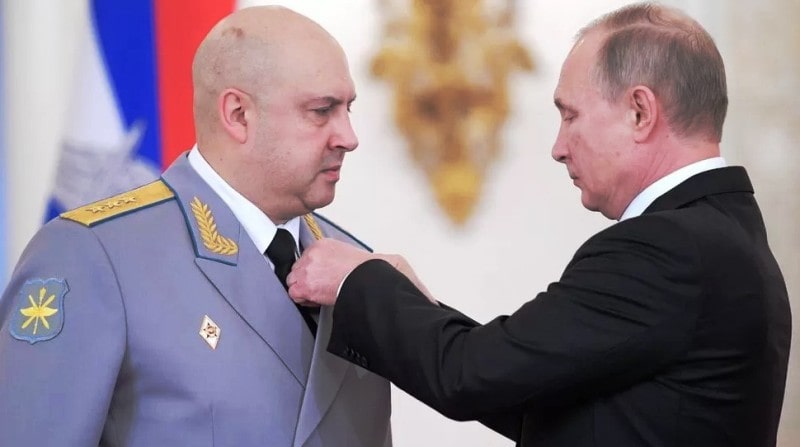 |
| Personal Life | |
| Date of Birth | 11 October 1966 (Tuesday) |
| Age (as of 2022) | 56 Years |
| Birthplace | Novosibirsk, Russian SFSR, Soviet Union (now Siberian Federal District, Russian Federation) |
| Zodiac sign | Libra |
| Nationality | Russian |
| Hometown | Novosibirsk, Siberian Federal District, Russia |
| School | Omsk Higher Military Command School |
| Educational Qualification | He is a graduate |
| Religion | Christianity |
| Controversies | • Accusations of violating human rights: In 1991, during a coup in Russia, Surovikin was accused of killing three civilians. Reportedly, Surovikin and his detachment of the 1st Rifle Battalion in the 2nd Guards Tamanskaya Motor Rifle Division were ordered to clear out a roadblock established by anti-coup protestors near a tunnel in Central Moscow and when Surovikin and his soldiers reached the tunnel in armoured cars, the angry mob surrounded them and threatened to assault them. Surovikin ordered his men to open fire on the crowd and ram through the roadblocks established by the mob. The orders of Surovikin led to the death of three civilians, while many were injured following which Surovikin was arrested by the Russian police but was released after a few months when Boris Nikolayevich Yeltsin entered the office of the President in 1991. [4]The Guardian [5]The Washington Post In 2020, a report was published by the Human Rights Watch, which stated that the Russian Armed Forces actively bombarded the places where civilians resided, and Sergei, despite being aware of the bombardment, did not take any step to prevent the bombings. [6]Radio Free Europe/Radio Liberty Human Rights Watch, through its report, said, "Sergei Surovikin is one of several Russian military commanders who knew or should have known about the abuses and took no effective steps to stop them or punish those directly responsible for the deaths of hundreds perhaps thousands of innocent civilians in Syria." In October 2022, the United Nations (UN) published a report on the human rights violations perpetrated by the Russian Armed Forces, under the command of General Sergei Surovikin, during the special military operation in Ukraine. In the report, the UN said that the Russian forces bombarded the areas of civilian residences. [7]Radio Free Europe/Radio Liberty The report further said, "We have documented patterns of summary executions, unlawful confinement, torture, ill-treatment, rape, and other sexual violence committed in areas occupied by Russian troops across the four regions covered by the report. The vast majority of the violations identified, Ukrainian forces have also committed international humanitarian law violations in some cases, including two incidents that qualify as war crimes.” • Accused of illegally selling arms and ammunition: When Sergei Surovikin was posted as a major at the Russian military academy M. V. Frunze in 1995, he was arrested by the intelligence department of the Russian Army for illegally procuring and supplying arms and ammunition to other officers attending a course at the military academy; however, after questioning Sergei for a few days, the Russian intelligence department closed the case as they could not find any conclusive evidence against him. [8]kommersant While giving an interview, the then-deputy director of the intelligence department, Sergei Fridinsky, said, "Being a student of the Frunze Military Academy, he was found guilty by the military court of the Moscow garrison of assisting in the acquisition and sale, as well as carrying firearms and ammunition without a proper permit (Article 17 , Part 1, Article 218 of the Criminal Code of the RSFSR). He was sentenced to one year of probation. Major Surovikin agreed to hand over a pistol to a colleague from another course, which was supposed to be used allegedly to participate in the competition. The major, unaware of the true intentions, fulfilled the order. During the interrogation, Sergei Surovikin said that he was sure that he was not doing anything illegal. When the investigation figured out that the officer had been set up, the charge was dropped and the conviction was canceled." • Accusations of assaulting a fellow officer: In March 2004, Lieutenant Colonel Viktor Chibizov, a Russian Army officer serving under Sergei Surovikin, accused Sergei of resorting to violence against him after Sergei found out that Viktor had voted for another Presidential candidate than Vladimir Putin. • Allegations of a senior Russian army officer committing suicide in his presence: According to sources, Colonel Andrey Shtakal, who was the deputy commander of the 34th motorized rifle division for weapons, killed himself with his service weapon in his office in front of his commander Sergei Surovikin after Sergei humiliated him in front of other military personnel during an inspection. After Colonel Shtakal's death, the Russian Ministry of Defence (MoD) constituted an investigative body, which, upon finding no evidence regarding Sergei Surovikin's involvement in the death of Colonel Shtakal, closed the case. [9]NEWSru.com |
| Relationships & More | |
| Marital Status | Married |
| Family | |
| Wife/Spouse | Not known |
| Children | Daughter(s)- 2 |
Some Lesser Known Facts About Sergei Surovikin
- Sergei Surovikin is a serving colonel general in the Russian Army who commanded the Russian military during its operations in Syria in 2017 and 2019. He came to the limelight in October 2022 when the Russian government made Sergei the commander of the Russian Armed Forces in Ukraine.
- Sergei Surovikin began his military career as an officer in the Russian Army after he completed his training at the Omsk Higher Military Command School in 1987.
- After commissioning in 1987 as a junior lieutenant, Sergei Surovikin was sent to Afghanistan, where he participated in the Soviet-Afghan War and served with the Russian special forces “Spetsnaz” till the end of the war in 1991.
- After Sergei Surovikin became a captain in 1991, he was posted to Moscow as the commander of the 2nd Guards Tamanskaya Motor Rifle Division of the Russian Army.
- After completing his tenure as a commander of the 2nd Guards Tamanskaya Motor Rifle Division, in 1995, Sergei attended a military course at the Russian military academy M. V. Frunze.
- Upon completing the military course at M. V. Frunze Military Academy, Sergei Surovikin was sent to the 92nd Motor Rifle Regiment as its chief of staff after which he was appointed the chief of staff of the 149th Guards Motor Rifle Regiment.
- Later on, Sergei Surovikin commanded Russia’s largest mountain warfare division, the 201st Division, in Tajikistan after which he was promoted and sent to another Russian Army’s infantry division as chief of staff.
- Sergei Surovikin attended a staff college course in 2002 at the Military Academy of the General Staff of the Armed Forces of the Russian Federation after which he was posted to the Volga-Urals Military District, where he commanded the 34th Simferopol Motorized Rifle Division.
- After the outbreak of the second Russian-Chechen War in 2004, Sergei Surovikin became a major general following which he was sent to the Chechen Republic, where he served with the 42nd Guards Motor Rifle Division as its senior commander.
- In 2005, Sergei Surovikin became deputy commander of the 20th Guards Combined Arms Army, which was conducting military operations in the Northern Caucasus region in Russia. Later, he became the 20th Guards Combined Arms Army’s commander.
- Sergei Surovikin was posted to Moscow in 2008 as the chief of the Main Operational Directorate (MOD) following which the Russian government appointed him as the Deputy Chief of the General Staff (DCGS) of the Armed Forces of the Russian Federation.
- Sergei Surovikin was posted to the Volga-Urals Military District in January 2010 as the chief of staff of the Russian Army garrison stationed there.
- After getting promoted to lieutenant general, Sergei Surovikin was sent as the Chief of Staff – First Deputy Commander to the Central Military District (TsVO).
- Upon completing his tenure at the Central Military District (TsVO), in 2011, Sergei Surovikin was posted at Kremlin in Moscow, where he oversaw the raising of the Russian Army’s Military Police (MP). Several sources reported that despite playing a role in raising the Russian military police, he could not become its first commander because of the objections raised by the office of the Military Prosecutor.
- Sergei Surovikin became the chief of staff of the Eastern Military District in Ulitsa Serysheva.
- Sergei Surovikin became the commander of the Russian Air Defense Forces in 2013. Later, the Russian Ministry of Defence (MoD) appointed him as the Eastern Military District’s commander after which he became colonel general in December 2013.
- In 2015, the Russian Ministry of Defence (MoD) announced that the Russian Army would participate in the Syrian Civil War and assist the Syrian Arab Army (SAA) in winning the conflict. In March 2017, Sergei Surovikin was sent to Syria by the Russian government to take over the command of the Russian contingent conducting operations in Syria. Talking about his deployment in Syria, he said,
The operation to liberate the territory of Syria from the terrorist groups like ISIS and Jabhat al-Nusra will continue until they are completely eliminated. The operation to liberate Syria from IS and Jabhat al-Nusra terrorists will continue and we will continue to aid the Syrian Arab Army in their military operations against the terrorists.”
- Several sources reported that when Sergei Surovikin took over the command of the Russian contingent in March 2017, the Russian and Syrian forces managed to re-capture more than half of the Syrian territory that was lost to organisations like ISIS, ISIL, and the Free Syrian Army (FSA). [10]kommersant
- After serving for a few months in Syria as the commander of the Russian forces, Sergei returned to Russia from Syria in September 2017 after the Russian Ministry of Defence (MoD) announced that Sergei Surovikin would be replacing Viktor Bondarev as the commander of the Russian Aerospace Forces.
- Sergei Surovikin served as the commander of the Russian contingent for the second time from January 2019 to April 2019. After coming back to Russia from Syria, he became the General of the Russian Army, a rank held by a small number of officers of the Russian Army. [11]TASS
- The European Union (EU) placed Sergei Surovikin under financial sanctions for playing a role in the formulation and implementation of policies that resulted in the fall of Ukraine’s territorial integrity, sovereignty, and independence. [12]Eur-Lex
- After the Russian military launched its “special military operation to denazify Ukraine” on 24 February 2022, [13]The Hindu the Russian military made Sergei Surovikin commander of the Army Group South, which was tasked with capturing the Ukrainian territory lying south of Russia. According to several Russian Ministry of Defence (MoD) sources, under the leadership of General Surovikin, the Russian ground forces, in a short span, made rapid advancements in Ukraine and captured a large portion of its territory; however, other Russian Army Groups did not perform as expected by the Russian government; therefore, in October 2022, the MoD replaced Colonel General Gennady Zhidko with General Sergei Surovikin as the overall force commander of the Russian military conducting operations in Ukraine. During an interview, after his appointment, Surovikin said,
The situation in this area is difficult. The enemy is deliberately striking infrastructure and residential buildings. Russian forces in the Kherson region have been driven back by 20-30 km (13-20 miles) in the last few weeks and are at risk of being pinned against the western bank of the 2,200-km-long Dnipro river that bisects Ukraine. So yes, the situation is tense, but let’s not panic. Panic is bad for everything. The Russian paratroopers and guards here are ready to defend, we have people, equipment and artillery here.”
- Reportedly, after Sergei Surovikin took over the command of the Russian forces in Ukraine, the Russian forces intensified their attempts to re-capture the territory lost to the Ukrainian Army during the Ukrainian counter-offensive.
- Sergei Surovikin consumes alcoholic beverages.
References/Sources:

